HOME / BMI WOODY GUTHRIE FELLOWSHIP RECIPIENTS
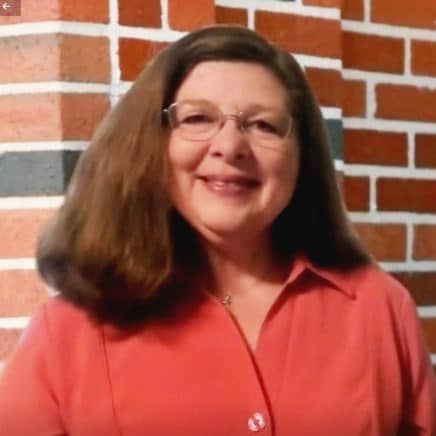 Professor of Psychology, Oklahoma State University.
Professor of Psychology, Oklahoma State University.
Project: TBD
Shelia M. Kennison is a Professor of Psychology at Oklahoma State University. She earned her Ph.D. in cognitive psychology from the University of Massachusetts at Amherst and a bachelor’s degree in psychology and linguistics from Harvard University. She is a fellow of the American Psychological Association and the Psychonomic Society. Her research interests include humor, language processing in monolinguals and bilinguals, and individual differences in verbal and physical risk-taking. In addition to research articles, she has published three books: An Introduction to Language Development, Psychology of Language: Theory and Applications, and the Cognitive Neuroscience of Humor. Her courses at Oklahoma State University include Psychology of Art, Psychology of Humor, Language Development, Cognitive Science, and Neurobiological Psychology.
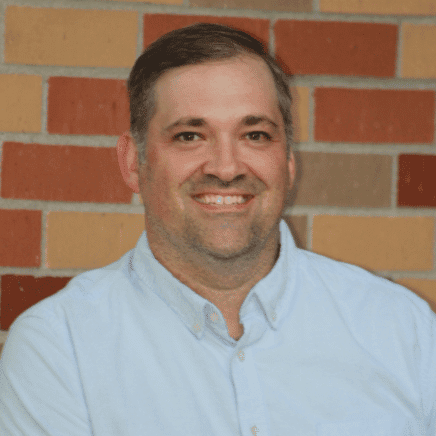
Assistant Professor, Social Studies Education, Delta State University in Cleveland, Mississippi.
Project: TBD
Justin Heath Krueger is an assistant professor of social studies education at Delta State University in Cleveland, Mississippi. He has a Ph.D. in curriculum and instruction from The University of Texas at Austin. His research has previously been published in The History Teacher, the Journal of Educational Controversy, and Multicultural Perspectives. Additionally, he is a regular contributor to publications and other research efforts of the Society for American Baseball Research. This fellowship supports a project on the comparative analysis of two of America’s most influential songsters: Woody Guthrie and Mance Lipscomb.
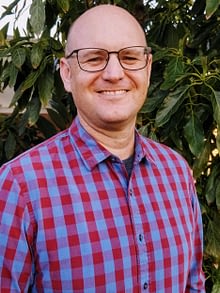
Ph.D. Candidate, History, University of California, Riverside
Project: Modern Folk: Popular Folk Music in the Cold War [forthcoming dissertation]
Stephen is a current Ph.D. student in history at the University of California, Riverside. He earned an MA in history from California State University, Long Beach, where his master’s thesis centered on folk revivalism in the late 1950s. Stephen’s work explores how music was understood and categorized in the public sphere and how discussions of folk music intersect with ideas about identity. His current research examines folk music in the context of Cold War culture.
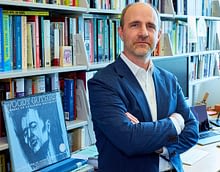
Assistant Professor of History, SUNY Brockport
Project: “This Machine Kills Fascists: What the Folk Music Revival Can Teach Us About the Digital Age”
Michael J. Kramer is an assistant professor in the department of history at SUNY Brockport. He specializes in modern U.S. cultural and intellectual history, transnational history, and public and digital history. He is the author of The Republic of Rock: Music and Citizenship in the Sixties Counterculture (Oxford University Press, 2013) and is currently writing a book about technology and tradition in the U.S. folk music movement, This Machine Kills Fascists: What the Folk Music Revival Can Teach Us About the Digital Age. He is also at work on a digital public history project about the Berkeley Folk Music Festival and the Sixties Folk Music Revival on the U.S. West Coast. In addition to experience as an editor, museum professional, and dance dramaturg, he has written numerous essays and articles for publications such as The New York Times, Washington Post, Salon, First of the Month, The National Memo, The Point, Theater, Newsday, and US Intellectual History Book Reviews. Kramer blogs at Culture Rover and Issues in Digital History. More information about his research, teaching, and public scholarship can be found at his website, michaeljkramer.net.

Artist
Project: Short film on the artwork of Woody Guthrie [title forthcoming]
Texas-born artist Aimee Bobruk is a chameleon of sorts; she can change colors. Her shapeshifting spirit is evident as an independent songwriter and filmmaker. Her original music straddles the genres of American folk and ambient folk-pop. Most notably, her self-titled record, /ba.’brook/, was selected by Texas Music magazine as one of top six indie albums released in the state in 2013. Performing Songwriter called the album “nothing short of a work of art.” In addition to writing and performing her own songs, Bobruk collaborates with songwriters and producers worldwide in the music publishing industry. To date, her co-writes have earned her seven European title tracks, two of which were nominated for Grammy Awards in Germany and Norway. In 2015, her pop co-write “Black Swan,” competed in Melodifestivalen to represent Sweden at the International Eurovision Song Contest. In the spring of 2018, Bobruk shifted gears and rode a motorcycle along the Texas/Mexico border to make her first documentary, Borderlanders. Her motto, “If you don’t know something, go find out,” lead her on a nine-day venture to meet and interview locals living at the edge. Most recently, Bobruk received the Marguerite and Lamar Smith Writing Fellowship, which gave her the opportunity to live and work in author Carson McCullers’ childhood home in Columbus, Georgia. Her three-month residence culminated in a performance of new original songs inspired by the writings of Carson McCullers. As a 2019 BMI Woody Guthrie Fellow she is thrilled to be working on a short stop motion animation inspired by the journals of Woody Guthrie. “I got goosebumps flipping through the pages of his journals. The pages overflow with stream of consciousness musings layered atop scribbles and drawings and doodles and little characters. He’s on fire. It is that energy that I’m aiming to capture in moving pictures.”
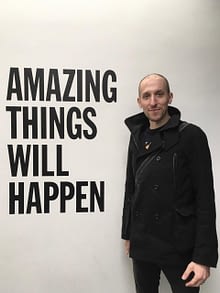
Independent Researcher, Nottingham, UK
Project: Spinning the Child: Constructions of childhood in recordings, radio and television(forthcoming book, Routledge, October 2020)
His Ph.D. and subsequent research has focused primarily on music made for children on recordings, radio, and television. This includes journal articles about Woody Guthrie’s music for children, jazz music in children’s television, and the quantitative analysis of recorded music for children. Liam was a member of the Britpop band Soda in the 1990s and worked as the music supervisor on the Joy Division biopic Control in 2006/7. Since 2008, Liam has written, recorded and performed music for children with his band Johnny and the Raindrops.
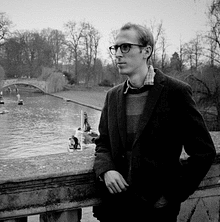
Ph.D. Candidate, American Literature at the University of Cambridge
Project: “A dance that is danced standing still: Poetic Motion in the Work of Woody Guthrie”
Jamie Fenton is a Ph.D. candidate in American literature at the University of Cambridge. While a BMI Woody Guthrie Fellow, he visited the Woody Guthrie Archive to conduct research for his MPhil dissertation, which explored versification, motion, and mobility across Guthrie’s work. As of 2020, Jamie is nearing completion of his Ph.D., which focuses on the poetry of the American Civil War and its acoustic features.
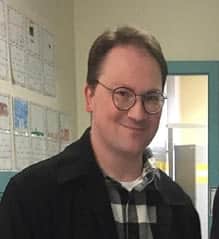
Two-time recipient of the BMI Woody Guthrie Fellowship and Professor of English at East Tennessee State University
Project: Two articles on the business and cultural impact of the 1950s/1960s “Hootenanny” trend [forthcoming, titles pending]
Professor Matthew D. Sutton holds a Ph.D. in American studies from the College of William and Mary and teaches English at East Tennessee State University. He is a two-time recipient of the Woody Guthrie/BMI Foundation fellowship (2009 and 2017). Materials gathered from his first fellowship, related to Guthrie’s environmentalism in his Columbia River songs, formed the basis of the essay “Green Pastures of Plenty: Woody Guthrie and Eco-citizenship” in the anthology Sounds of Resistance: The Role of Music in Multicultural Activism (Praeger, 2013). Currently, he is completing two articles using primary sources from the Woody Guthrie Center’s Ronald D. Cohen Folk Music Research Collection, the Stetson Kennedy Papers, and the Phil Ochs Papers. Dr. Sutton’s work has appeared in venues such as Popular Music and Society, Studies in American Culture, and the recent edited collections Swamp Souths and Southern Comforts: Drinking and the U.S. South.
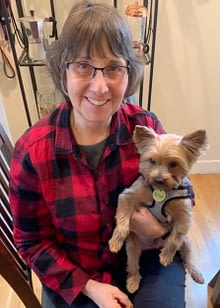
Author
Project: “A Journal of Rediscovered Objects Why Marjorie?”
When Laura taught high school in the mid-1970s, her Folk Club visited nursing homes and raised money for Marjorie Guthrie’s Committee to Combat Huntington Disease. Laura kept Marjorie’s handwritten thank you notes which —40 years later— inspired her to find out more about Marjorie (who had died in 1983) by means of an “enrichment project,” while completing her MFA in writing at Western Connecticut State University. As a 2016 BMI Woody Guthrie Fellow, Laura was able to visit the Woody Guthrie Archives for a week. She left the intense week of research convinced that Marjorie was the most influential Guthrie of all based on her career as a Martha Graham dancer, her preservation of the Woody Guthrie’s legacy, and, most of all, her work that started what is today the Huntington Disease Foundation.
She is the author of Staying Alive: A Love Story, a memoir of loss and recovery which received a 2012 Readers View Award and has been recommended by the American Institute of Health Care Professionals. She has written “If I Knew Then” features for Crain’s Business Newsletter and currently covers business stories for seven Connecticut towns in the North Central News monthly. Her blogs for Seven Ponds — Embracing the End of Life — can be read at Laura B. Hayden blogs at Sevenponds.

Musicology at the University of Kansas
Project: “Woody’s Songs Go To War on the BBC”
Christy J. Miller has a Ph.D. in musicology from the University of Kansas. She holds a bachelor’s degree in Oxbridge music from William Jewell College, as well as a M.M. in musicology from the University of Kansas. She specializes in American folk music and is particularly interested in the repertoire from the Great Depression through the American Folk Revival of the 1960s. This fellowship supported her research for her dissertation, which examines the use of American ballad opera on BBC radio during the Second World War (in which Woody Guthrie played a significant role). During her free moments, Christy enjoys spending time in the yard, in her kitchen, and with her family.
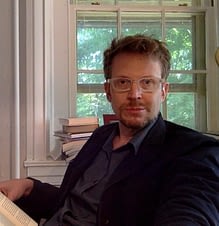
Professor of English at Haverford College
Project: Woody Guthrie: An Intimate Life [forthcoming book, Beacon, October 6, 2020]
Gustavus Stadler is professor of English at Haverford College where he teaches courses on American literature and culture. He is the author of Troubling Minds: The Cultural Politics of Genius in the U.S. 1840-1890(University of Minnesota, 2006).
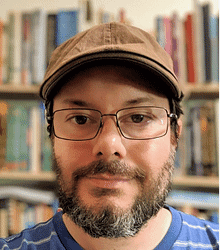
Lecturer at North Park Theological Seminary in Chicago
Project: “Ninety Days for Vagrancy: Listening to Woody Guthrie in the Age of Mass Incarceration” [public lecture scheduled for 2021]
Since conducting research in the Woody Guthrie Archive, Will has given two short presentations in the “Prison Literature” session at the Midwest Modern Language Association: “Woody Guthrie as Historical Witness to Incarceration” and “The ‘Gospel’ of Sacco & Vanzetti According to Woody Guthrie.”
Last year, Will was awarded the Victor Obenhaus Lectureship at Chicago Theological Seminary and was scheduled to give a lecture in the spring of 2020 titled “Ninety Days for Vagrancy: Listening to Woody Guthrie in the Age of Mass Incarceration.” However, COVID-19 restrictions led to the cancellation of all events and the lecture will be rescheduled sometime in the 2020-2021 academic year. The lecture will be open to the public and live-streamed.
At the bottom of the original hand-typed lyrics of his best-known composition, “This Land is Your Land,” Woody Guthrie scribbled the words, “*all you can write is what you see.” This assertion aptly characterizes Guthrie’s work as testimony to what he saw, the people he met, and the struggles he observed. That testimony includes an evolving witness to incarceration: his work as collector and imitator of prison songs; his nights in jail for vagrancy or public drunkenness; his friendship with former prisoner and fellow songwriter Huddie Leadbetter; his ballads memorializing Nicola Sacco and Bartolomeo Vanzetti; his six-month federal jail sentence under the Comstock Law; and, finally, his prison-like confinement in mental hospitals where he would spend his last years. This lecture will trace the development of Woody Guthrie’s witness to incarceration and situate it in the larger tradition of prison witness. Like other such witnesses, Woody Guthrie writes in resistance to the dehumanization of carceral practice, implicates his reader/listener in its violence, and offers a new vision of freedom. True to his own words—“A folk song is what’s wrong and how to fix it”—Woody Guthrie bequeaths to us resources for facing contemporary challenges presented by the rise of Mass Incarceration in the United States.
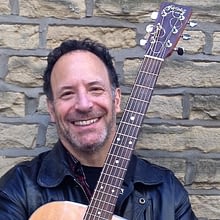
Two-time recipient of the BMI Woody Guthrie Fellowship and Professor of American Literature at the University Central Lancashire, England
Projects: Woody Guthrie’s Modern World Blues [book, University of Oklahoma Press, 2017); Mapping Woody Guthrie [book, University of Oklahoma Press, 2019]; Woody Guthrie American Radical [book, University of Illinois Press, 2011]
Professor Will Kaufman studied English and History at Montclair State College, New Jersey, and was a Marshall Scholar at the University of Wales, Aberystwyth, where he earned his Ph.D. in American Literature. He is currently professor of American literature at the University of Central Lancashire, England.
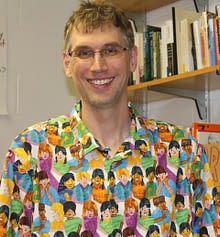
Associate Professor of Education at Penn State University
Project: “The Civic Voice of Woody Guthrie”[a series of public presentations]
Professor Kissling began a long-term inquiry into the history and cultural significance of “This Land Is Your Land” in 2008, with a special interest in the teaching of the song in U.S. schools. With banjo and guitar in hand, he routinely talks and sings at schools in Central Pennsylvania about Woody Guthrie and “This Land Is Your Land.” In addition to visits to the Woody Guthrie Archives, he has spent time in the archival collections of the Library of Congress and Smithsonian Folkways. Additionally, he has interviewed a number of people related to the project, including Billy Bragg, John Cohen, Nora Guthrie, Sarah Lee Guthrie, Abby Karp, Guy Logsdon, Pete Seeger, Bruce Springsteen, and many students and teachers, past and present. Presentations related to the project thus far include:
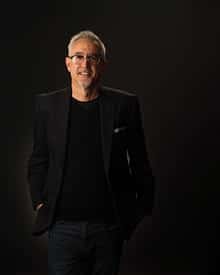
Patricia Carlin O’Keefe Distinguished Professor of History and Chair of the Department of History at Loyola University New Orleans
Project:The Intentional Troubadour: Woody Guthrie’s Travels through the Twentieth Century, a work of American history that leans heavily on Woody’s axiom “All You Can Write Is What You See” [forthcoming book]
Professor Mark F. Fernandez has been working on several writing projects and museum exhibits that build on his research from the Woody Guthrie Archives. Fernandez has already published two scholarly articles in The Woody Guthrie Annual: “’Ruination Day’: Gillian Welch, Woody Guthrie, and Disaster Balladry,” The Woody Guthrie Annual, Vol. 4, (2018), 40-53. Fernandez consulted on the Woody Guthrie Center’s 2014 Black History Month Exhibit and has co-curated two exhibits at the Woody Guthrie Center, “Woody, Einstein, and the Atomic Bomb (With Deana McCloud and Kate Blalack) and, most “Woody Guthrie and the Folk Revival” (With Deana McCloud, Gustavus Stadler, and Stephen Petrus). Fernandez has given numerous presentations beginning with Woody at 100 conferences at Penn State University (2012), several presentations at the Annual Woody Guthrie Symposium, as well as at international conferences such as The International Association for Popular Music, Folk Alliance International. He has participated in panels about Guthrie with established Americana musicians such as Jimmy LaFave, Billy Bragg, Radney Foster, Will Hoge, and Alejandro Escovedo at AmericanaFest. His research has been the center for numerous public lectures including the Homer L. Hitt Distinguished Presidential Lecture at the University of New Orleans, The Bedlam and Osher Lectures Series in Oklahoma City, and several public lectures at the Woody Guthrie Center.
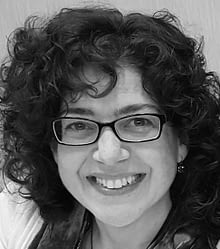
Professor of English and Coordinator of Gender Studies at the University of North Carolina at Pembroke
Project: “Remembering Rosie: Gender and Family Dynamics in Woody Guthrie’s Ballads of Sacco and Vanzetti” [informs chapter of forthcoming manuscript]
Professor Michele Fazio teaches courses on American literature, contemporary U.S. ethnic literature, and working-class studies. Her documentary film, Voices of the Lumbee, earned both the Studs Terkel Award for Media and Journalism and the North Carolina Folklore Society Brown-Hudson Award. She has served as president of the Working-Class Studies Association and is currently a member of the editorial collective for the Journal of Working-Class Studies. She co-edited the Routledge International Handbook of Working-Class Studies (forthcoming fall 2020), and her research on family history, community, and memory has been exhibited at the Harvard Law School Library and the American Labor Museum. Her current book project draws upon the music of Woody Guthrie to explore the cultural legacy of Sacco and Vanzetti.